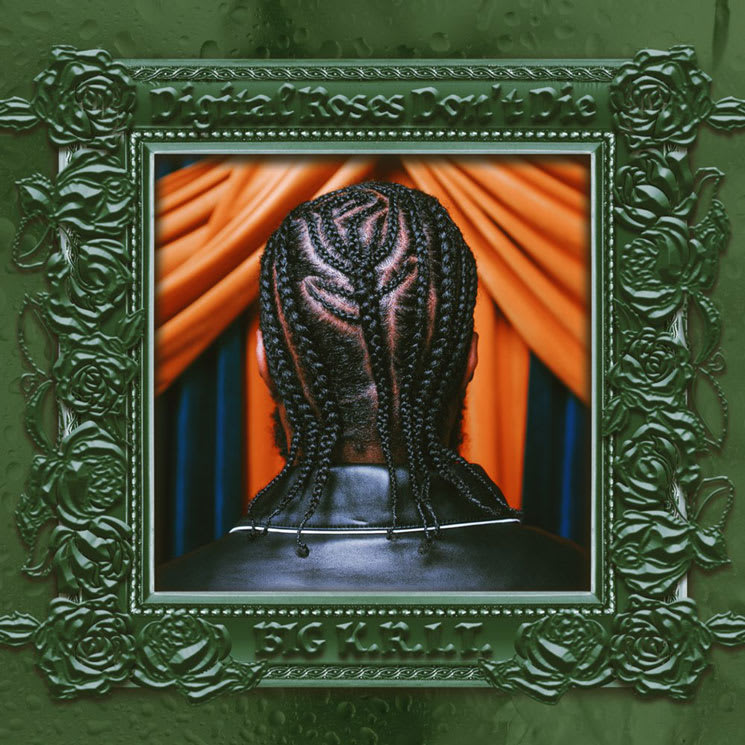To date, Big K.R.I.T. has been a dependable, if not predictable rapper whose appeals remained evident across his albums and mixtapes. His last album, K.R.I.T. IZ HERE, didn't exactly reinvent his sound, but it also wasn't an offensively bad release. Enter Digital Roses Don't Die: the Mississippi artist's attempt at making a neo-soul album, largely abandoning the soundscapes that once defined him.
Gone are the trunk-rattling beats that defined early mixtapes like Return of 4Eva. Instead, K.R.I.T. dedicates Digital Roses Don't Die to love and the shock of ending up with someone who didn't share the same upbringing that he did. "Southside of the Moon" chronicles his falling in love with someone born in New York and living in Los Angeles. It's not particularly detailed on his part, barely cracking the two-minute mark, but K.R.I.T. uses the brevity to emphasize that the woman in question is the real focus: "I ain't mad at 'em if they ain't recognize my face / I still smile in this mansion, thuggin' cause I get around / All eyes on you when you in town."
If nothing else, Digital Roses Don't Die is the most heartfelt K.R.I.T. has been since 2017 double album 4eva Is A Mighty Long Time. Though the tracks don't always delve deep into the rapper's psyche, there are moments of true self-reflection. "Generational - Weighed Down" sees K.R.I.T. reflect on his insecurities, expressing concern over being a parent and developing addictive habits: "What if I ain't meant to be a parent? / What if I'm a lost soul damaged? / What if I can't slow down the throttle? / What if I can't put down the bottle?" Further reflection is found in songs like "It's Over Now" and "Would It Matter?," but fail to add more depth to the artist's ethos.
While more conceptual than his previous album, Digital Roses Don't Die suffers from a minor identity crisis. Four interludes, named for the four classical elements of nature, none of them seem to separate the feelings of the album. "Fire (Interlude)" is supposed to act as a fiery opener about passion, but fails to set the tone of the next four tracks until the next interlude. Their inclusion feels more like a forced concept than a distinct separation of the album's varying moods.
Despite ditching the southern rap tropes in his aesthetic switch, Big K.R.I.T.'s efforts to make a neo-soul album mostly work. He has a lovely singing voice and an excellent ear for beats, but doesn't always hit the mark. Lacking the depth of his more memorable efforts, Digital Roses Don't Die sounds more like an album Big K.R.I.T. made for himself rather than something he expected his fans to collectively laud.
(BMG)Gone are the trunk-rattling beats that defined early mixtapes like Return of 4Eva. Instead, K.R.I.T. dedicates Digital Roses Don't Die to love and the shock of ending up with someone who didn't share the same upbringing that he did. "Southside of the Moon" chronicles his falling in love with someone born in New York and living in Los Angeles. It's not particularly detailed on his part, barely cracking the two-minute mark, but K.R.I.T. uses the brevity to emphasize that the woman in question is the real focus: "I ain't mad at 'em if they ain't recognize my face / I still smile in this mansion, thuggin' cause I get around / All eyes on you when you in town."
If nothing else, Digital Roses Don't Die is the most heartfelt K.R.I.T. has been since 2017 double album 4eva Is A Mighty Long Time. Though the tracks don't always delve deep into the rapper's psyche, there are moments of true self-reflection. "Generational - Weighed Down" sees K.R.I.T. reflect on his insecurities, expressing concern over being a parent and developing addictive habits: "What if I ain't meant to be a parent? / What if I'm a lost soul damaged? / What if I can't slow down the throttle? / What if I can't put down the bottle?" Further reflection is found in songs like "It's Over Now" and "Would It Matter?," but fail to add more depth to the artist's ethos.
While more conceptual than his previous album, Digital Roses Don't Die suffers from a minor identity crisis. Four interludes, named for the four classical elements of nature, none of them seem to separate the feelings of the album. "Fire (Interlude)" is supposed to act as a fiery opener about passion, but fails to set the tone of the next four tracks until the next interlude. Their inclusion feels more like a forced concept than a distinct separation of the album's varying moods.
Despite ditching the southern rap tropes in his aesthetic switch, Big K.R.I.T.'s efforts to make a neo-soul album mostly work. He has a lovely singing voice and an excellent ear for beats, but doesn't always hit the mark. Lacking the depth of his more memorable efforts, Digital Roses Don't Die sounds more like an album Big K.R.I.T. made for himself rather than something he expected his fans to collectively laud.
